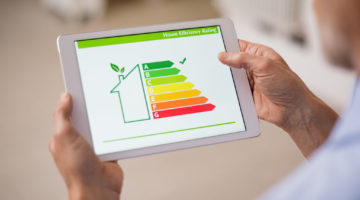
Domestic EPCs are pretty well understood – most houses have had one done by now and there are several reasons for having one. Commercial EPC‘s are less widely carried out, mainly because the reasons for having them crop up much less often.
Why do you need a commercial EPC?
You will need an EPC on your premises if you are:
- Selling the property
- Renting out the property
- Building a property
- Claiming government funding for Feed in Tariff’s
What makes a commercial EPC different?
Apart from the obvious – that a commercial EPC is carried out an a commercial property rather than residential, there are some fundamental differences in how the survey is carried out.
- A commercial EPC looks at how each area of the building is used – whether that is for office purposes, dining areas, storage or a workshop area for example. A domestic assessment purely looks at the fabric of the building – what type of wall and the area of the space. This means that a commercial EPC can fundamentally change depending on the user present, whilst a domestic EPC will not change with different occupants. Having said this, a commercial EPC does not take into account your energy usage, like a Green Deal Assessment, so occupancy is only partially reflected in the EPC.
- Commercial EPCs have to consider a far wider range of properties. A domestic property always has a bathroom, bedrooms, a living room and kitchen. A commercial property could have any number of different possible rooms, some the size of aircraft hangers and some little cubicles, some heated, some only partially heated. This huge variety makes the assessment process much broader with many more things to consider. It means there is a much wider range of possible heating and cooling systems.
- The variety means that there are assessors for different types of building – the accreditation goes from level 3 to level 5 non-domestic energy assessors. The vast majority of assessors are qualified to level 4, which allows them to produce EPCs for most properties in the country. Level 5 assessors are the only ones allowed to produce certificates on complex properties with large atria and curved structures. For most customers this won’t be an issue, but if you have a very unusual property, you may need to pay more for a level 5 assessor – there aren’t that many around the country as the demand is not very high!
- The process to produce a commercial EPC is much less automated. Over the years, the domestic EPC has been refined by the various accrediting bodies, and various streamlined software produced to allow the EPC to be carried out quickly and simply. The commercial EPC is currently a smaller market, and that has meant the various software and support has lagged behind. Consequently commercial EPCs are much more time consuming for the assessor and will cost more to produce. You could expect your assessor to be on site for hours, and in some cases may need to revisit another day. They will also ask for a number of different types of documentation on the building and the building services, so be prepared to provide specs on the HVAC systems, floor plans, planning documentation, details on any renewable installations and any number of other pieces of information that the assessor may not be able to ascertain themselves from a site visit.
- Cost is one really big difference. Domestic EPCs, even for the biggest of properties, should cost well under £100, with some companies offering them for under £50. Commercial EPCs are much more expensive, with starting prices for smaller properties starting at £100-150 and larger properties costing several hundred. The largest and most complex properties could cost you thousands. You are much more likely to find wildly different prices in the commercial sector also, with the competition not quite the same.
So there are a few things to consider with a commercial EPC that you wouldn’t have to think about with a domestic assessment. The key thing is to make sure you provide your assessor with as much information as they require, and allow them access to the whole property. This will ensure that you get a more accurate reflection of your property. The more information you provide, the less the assessor will have to assume default values (these are always poor and will produce a much lower rating on your EPC) and the higher your EPC is going to be.
Give us a call if you have any queries about your commercial premises – we will be happy to help and provide a quote.













No Comments yet! Be the first one.